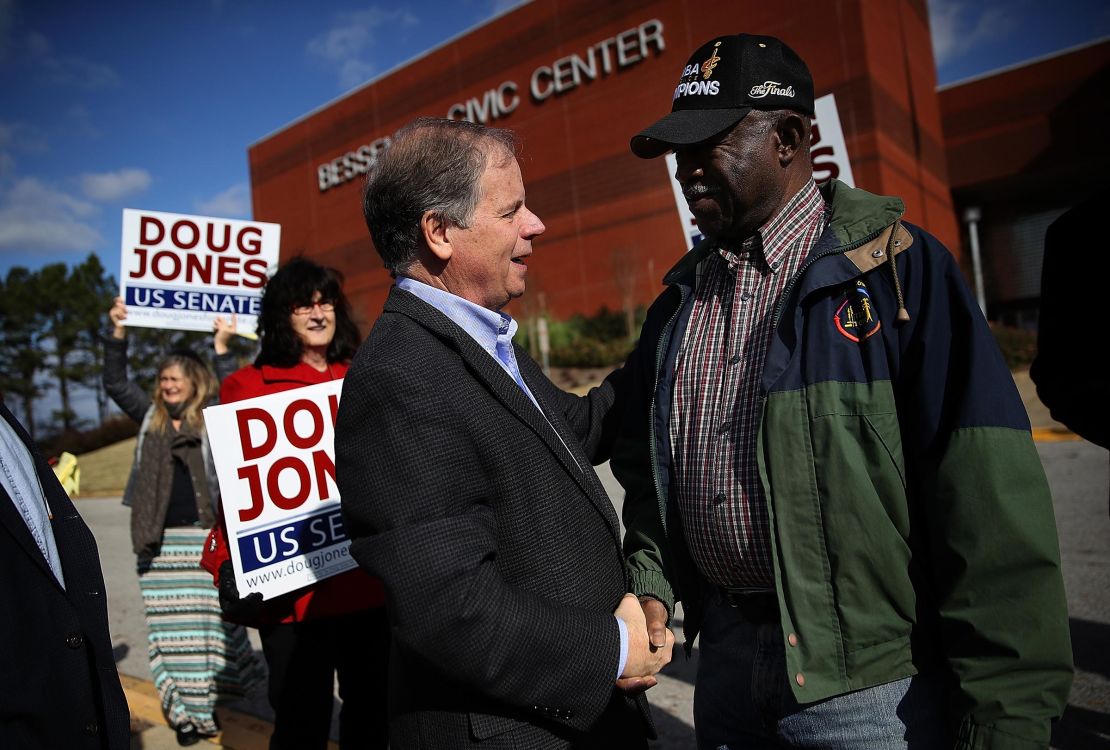CNN
—
The good news, say Democratic leaders and top party strategists wrapping their heads around what Donald Trump’s next 45 months will mean, is that there is no shortage of actual impacts to talk about – and that’s before the market turmoil has had the effect on prices or jobs that they expect.
The bad news, they say: the speed and thoroughness out of the White House keeps scrambling their already frantic efforts to fight back.
Every bad Trump poll number has top Democratic operatives and officials wondering if they’re actually seeing the country start to move their way again or if they’re just talking themselves into seeing that.
It’s what Illinois Rep. Sean Casten, first elected in the anti-Trump wave of 2018, calls a progression from apathy to fear to anger to action.
Now: “I think we’re moving from incoherent to directed anger,” Casten said, then added his own stage direction: “He says, optimistically.”
Beyond the arguments in private meetings or posts ripping into each other online, often odd and unexpected alliances within the Democratic Party have been hammering out ideas and tactics over group texts and quiet phone calls. Not having agreed on leaders or set organizing principles have come at a cost. Post-election promises of really digging into the data to figure out what went wrong have faded, but Democrats have started to actually rethink both what they’re saying and how they’re saying it in ways that go far beyond spats over wording or insisting that they should all do more podcasts.
“If you think it’s survivable if you just wait it out, you’re just waiting,” said Michigan Sen. Elissa Slotkin, who followed up being picked for the Democrats’ official response to Trump’s address to the joint session of Congress last month by starting a series of speeches aimed at laying out her own vision for what her party’s political argument should be. “If you think he’s doing things to our democracy that we can’t come back from, then you’re moving in a much more panicked way.”
“So many people are predisposed to believe that Trump’s second term is as incompetent as his first term. It’s hard to believe that Trump’s team is more competent than it was in the first term even though Trump himself sounds less coherent,” said Connecticut Sen. Chris Murphy.
Murphy said that adjusting his own approach to get more people to see this Trump administration as a threat has meant going long form – extended threads of posts on social media, explainer videos, speeches built around connecting the dots like the one he gave at a town hall in a North Carolina House district represented by a Republican.
None of that, Murphy acknowledged, is an answer or even a plan to get to an answer. Still, he says he at least thinks the country is getting primed for the deeper political reconsideration that needs to happen as he balances his own more institutional Democratic politics with urging colleagues not to write off independent Vermont Sen. Bernie Sanders as “fringe” and instead see Sanders’ populism as “the crossover message that could potentially cut into Trump’s base.”
“I don’t think necessarily people know what to do given that the level of peril is so high, but at least we’re not arguing anymore whether something insidious going on,” Murphy said.
Trying to break through despite having no actual power in Washington, Democrats have fanned out in person and online, with events like Sunday’s live streamed sit-in on the Capitol steps to call out specific impacts from the proposed Republican budget led by New Jersey Sen. Cory Booker and House Minority Leader Hakeem Jeffries.
Jeffries kicked things off by quoting Ulysses S. Grant’s writing, “There are but two parties in America right now: patriots and traitors.”
With the midterms still a year and a half away, Democrats looking for actual action are hoping not just for wins in courts, but for the Trump administration to abide by losing. On Wednesday, 12 states with Democratic attorneys general sued the Trump administration for “illegally imposing” tax hikes on Americans through tariffs, following a separate lawsuit challenging the president’s tariffs from California Gov. Gavin Newsom and Attorney General Rob Bonta.
“This is going to be a marathon. We know that,” said Arizona Attorney General Kris Mayes, who was part of the tariff lawsuit filed last week. “We know that we’ve got a four-year period that we have to cover here to make sure that our country can survive this absolutely lawless presidency, and someone who, I would argue, is trying to carry out a coup on our country.”
Mayes is one of 23 Democratic attorneys general, a group that holds nearly daily virtual meetings to coordinate their work, discussing what they know about Trump’s actions and determining whether they have legal standing to pursue a lawsuit. “The secret sauce for us has been the fact that we are working together as attorneys general,” she said.
Many state attorneys general, including Mayes, have been holding their own town halls.
“We have to win in the courts to prevent these unconstitutional actions from going into place,” said Mayes, who is up for reelection next year in a battleground state Trump won. “But second, we have to win hearts and minds.”
Democrats hope to rekindle faith in government — and Democrats
Well outside of Washington in a state that is deep blue but in November showed significant erosion to Trump in the kinds of places Democrats never assumed they would have any trouble, Massachusetts Gov. Maura Healey as been strategizing with other governors behind the scenes, but leaving most of the nationalized political pushback against Trump to others.
Healey’s days have become responsive to the White House now that building materials now entangled by tariffs are holding up her own housing agenda; the universities and hospitals in her state dealing with research cuts; and business executives are already seeing orders cut and potential layoffs from supply chain worries.

In a roundabout way, she said those efforts have opened more people up to what Democrats can do in government by giving the party concrete examples of what they’re doing to push back. But a lot of what Healey said she is doing is also just consoling those around her. She said a woman with multiple sclerosis came up to her at event where she was planting trees with a Girl Scouts troop, crying about the disease research that has been shut down.
“It’s why I’ve been fighting the president on this,” Healey recalled saying.
Unable to provide any actual solutions, Healey gave the woman a hug.
Sometimes, Healey said, just showing compassion helps.
“This is not a hypothetical. People have felt real pain already,” Healey said.
That kind of going local, said Rep. Pat Ryan, is how he’s been approaching outreach in his upstate New York district where he ran double digits ahead of former Vice President Kamala Harris and won another term last year. From food banks to veterans’ medical centers, he has convened events where he speaks for just a few minutes before turning over the microphone to constituents talking about the effects on their lives and businesses, as often as he can also including Republican local officials caught between staying true to Trump and speaking out against impacts they hate too.
“The awareness of the harm because of the playbook we’ve been running — not talking about national numbers, but being local, specific and tangible and focusing on harms that have been inflicted, not things that are hypothetical, that’s really on scale broken through,” Ryan said.
Democrats grasping for good news found some in the state supreme court race they won in Wisconsin and the state senate seats they flipped in Iowa and Pennsylvania.
That’s a sign of more to come, they argue.
“At the beginning of the Trump administration, a lot of Democrats viewed Trump as a popular president that they needed to find ways to work around,” said Wisconsin state Democratic chair Ben Wikler. “The reality is he was always on a trajectory to break so many things and infuriate so many people that he would become a profoundly unpopular president.”
Run for Something – a group focused on recruiting and training young progressives for state and local elections – has had 40,000 people since November sign up expressing interest in running for office, said Amanda Litman, the group’s co-founder and president.
“These are folks who are looking around and seeing that if no one is going to fight for them, they have to fight for themselves,” said Litman. “They are willing to put their careers on hold or change their lives to ultimately make a difference in their community.”
Litman said she will soon launch an initiative focused on the second 100 days of the Trump administration and is encouraging candidates to talk about their anger with the president’s action in personalized ways for their communities.
Newbies aren’t the only ones feeling inspired. Doug Jones, who won a 2017 special election for a Senate seat in Alabama and then lost it by 20 points in 2020, told CNN even he’s thinking about another run.

“I’ve said all along, sooner or later, some of this is going to start catching up to Republicans in Alabama,” Jones said.
“Would it be a tough slog?” Jones said. “Absolutely. But the way things are going right now, you can never tell where that lightning might strike.”
Strength and stress with donors
Signs of grassroots donor energy for Democrats abound. ActBlue, the main online fundraising platform for Democratic candidates and causes, had a record quarter, taking in more than $400 million across all its candidates’ accounts between January and March 31, the organization said. And New York Rep. Alexandria Ocasio-Cortez raised a staggering $9.6 million in the first three months of the year as she toured the country with Sanders on his “Fighting Oligarchy” tour.
But at the same time that Republicans are moving to change voting procedures in ways that would likely complicate elections for Democrats, the administration has specifically targeted that fundraising. The president signed a memorandum Thursday essentially directing Attorney General Pam Bondi to investigate ActBlue on claims from GOP-led congressional committees that it enabled fraudulent contributions. This prompted an outcry that also led to the group’s processing $5.6 million in donations in a single day as news of the move spread. It also has Democratic strategists admitting they’re not at all prepared for what happens next.
No immediate fallback is in place, which a number of Democratic operatives say should already be a priority.
The party’s biggest donors have other issues. One Democratic strategist who has served as a philanthropic adviser to billionaires said radical action is needed to confront the threat posed by Trump and his administration’s actions. Democrats, the person said, should concentrate on mounting resistance to Trump at the state level – given the president’s demonstrated disdain for Congress and the courts.
“He’s made it very clear: He doesn’t care what the other two branches say, and the other branches don’t have guns,” said the person, who requested anonymity for fear of retribution. “He has lots of guns.”
Other donors declined requests for comment about what they’re doing to help the party. Several have also turned down entreaties from Democratic leaders, claiming either that they’re unhappy with the party or too scared themselves of Trump retribution in ways that are enraging Democratic leaders privately.
The agonizing churn is feeding outsized attention to spats like the one among Democratic National Committee leaders over vice chair David Hogg’s promise to support primary challenges against incumbents, or the Democratic leader of the Florida state senate leaving the party last week with a floor speech declaring, “our constituents are craving practical leaders, not political hacks.”
Even Slotkin’s series of speeches set off its own day of internal online battle last week when she criticized those using the word “oligarchy,” seemingly prompting an indirect clapback from Ocasio-Cortez, who posted that “plenty of politicians on both sides of the aisle feel threatened by rising class consciousness.”
“The times have come for us, and we need to do what the Democratic Party isn’t particularly good at, which is strategic planning and a coordinated message. It’s not that everybody has to say the same thing, but we have to be playing on the same team,” Slotkin said. “Sometimes in moments of desperation, people actually come together and for the sake of the country, for the sake of their communities, get on the same page. That’s what I’m hoping for.”
Correction: This story has been updated to correct the spelling of Gov. Maura Healey’s last name throughout.



